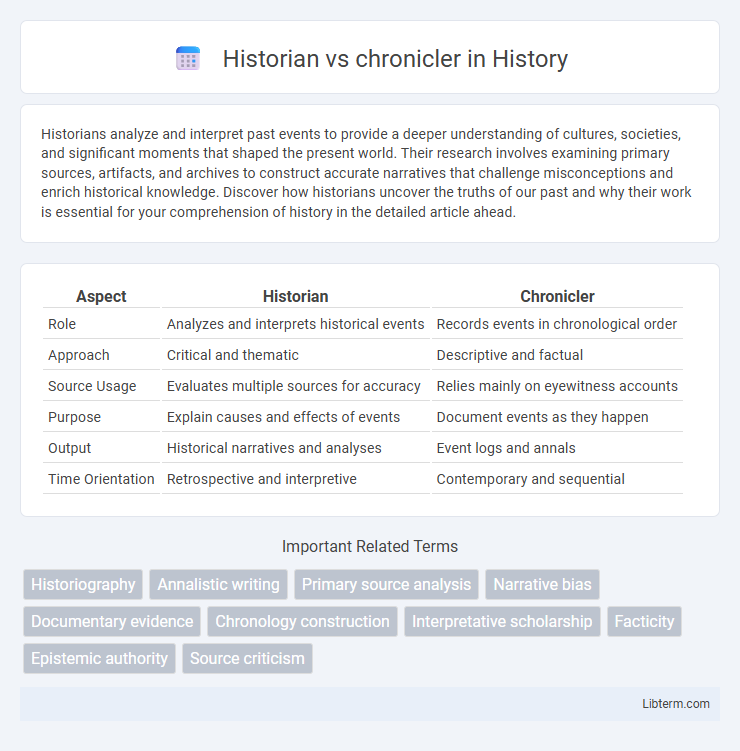Historians analyze and interpret past events to provide a deeper understanding of cultures, societies, and significant moments that shaped the present world. Their research involves examining primary sources, artifacts, and archives to construct accurate narratives that challenge misconceptions and enrich historical knowledge. Discover how historians uncover the truths of our past and why their work is essential for your comprehension of history in the detailed article ahead.
Table of Comparison
| Aspect | Historian | Chronicler |
|---|---|---|
| Role | Analyzes and interprets historical events | Records events in chronological order |
| Approach | Critical and thematic | Descriptive and factual |
| Source Usage | Evaluates multiple sources for accuracy | Relies mainly on eyewitness accounts |
| Purpose | Explain causes and effects of events | Document events as they happen |
| Output | Historical narratives and analyses | Event logs and annals |
| Time Orientation | Retrospective and interpretive | Contemporary and sequential |
Defining the Roles: Historian vs Chronicler
Historians analyze, interpret, and synthesize past events using critical methodologies, aiming to provide a comprehensive understanding through context and cause-effect relationships. Chroniclers document events in chronological order, often without analysis, focusing on recording facts and occurrences as they happen. The distinction lies in historians' emphasis on analytical narratives versus chroniclers' role as factual recorders of history.
Origins and Historical Backgrounds
Historians trace their origins to ancient Greece and Rome, where figures like Herodotus and Thucydides established systematic methods for investigating and interpreting past events based on evidence and critical analysis. Chroniclers emerged in medieval Europe, primarily as monastic scribes who documented events year-by-year without extensive interpretation, focusing on preserving a chronological record. The historical background of historians involves analytical narratives aiming to explain causes and effects, whereas chroniclers prioritize recording events as they occurred, often blending factual entries with folklore or religious contexts.
Purpose and Objectives of Their Work
Historians aim to analyze and interpret past events to understand causes, contexts, and consequences, providing a critical and evidence-based narrative. Chroniclers focus on recording events in chronological order without extensive analysis, offering a straightforward account of occurrences as they happened. The objective of historians is to contribute to knowledge and inform future decisions, while chroniclers primarily preserve a factual record for immediate reference or posterity.
Approach to Recording Events
Historians analyze and interpret events using critical evaluation of sources, aiming to construct an accurate, evidence-based narrative. Chroniclers primarily document events in chronological order without extensive analysis, focusing on recording occurrences as they happened. This distinction highlights historians' emphasis on context and causality versus chroniclers' role in straightforward event preservation.
Use of Sources and Evidence
Historians rigorously analyze diverse primary and secondary sources to construct evidence-based narratives, emphasizing critical evaluation and contextualization of data to ensure accuracy and objectivity. Chroniclers primarily document events in chronological order, often relying on eyewitness accounts or contemporaneous reports without extensive interpretation or verification. The historian's method involves cross-referencing multiple sources and applying scholarly methodologies, while chroniclers focus on recording events as they occur, with less concern for analytical depth or source criticism.
Analytical vs Descriptive Narratives
Historians engage in analytical narratives by examining causes, contexts, and implications of events, using critical evaluation of sources to construct evidence-based interpretations. Chroniclers provide descriptive narratives, recording events in chronological order without extensive analysis or interpretation, focusing on factual detail. The analytical approach of historians aims to understand significance and patterns, while chroniclers prioritize documenting occurrences as they happen.
Impact on Shaping Historical Memory
Historians analyze events using critical methodologies and evidence, offering interpretations that influence academic understanding and collective memory. Chroniclers record events contemporaneously without extensive analysis, providing raw accounts that shape immediate public perception and cultural narratives. The historian's contextualized narratives often guide long-term historical memory, while chroniclers preserve foundational details essential for future interpretation.
Examples of Renowned Historians and Chroniclers
Herodotus, often called the "Father of History," exemplifies renowned historians by providing detailed, analytical accounts of the Greco-Persian Wars, while chroniclers like the Venerable Bede meticulously recorded the chronological events of early English history without extensive analysis. Another prominent historian, Thucydides, offered critical, evidence-based narratives of the Peloponnesian War, in contrast to medieval chroniclers such as Snorri Sturluson, who compiled Norse sagas primarily for preservation rather than interpretation. These distinctions highlight historians' focus on context and causality versus chroniclers' role in recording events sequentially.
Evolution of Historical Writing Practices
Historians analyze and interpret past events through critical evaluation of sources, shaping historical narratives with contextual understanding and theoretical frameworks. Chroniclers primarily record events sequentially without extensive analysis, focusing on factual documentation and preserving immediate accounts. The evolution of historical writing has transitioned from straightforward chronicle entries to complex historiographical methodologies that emphasize cause, effect, and wider societal implications.
Relevance in Contemporary Historical Studies
Historians employ rigorous methodologies, including critical analysis of primary and secondary sources, to construct comprehensive narratives that interpret past events within broader social, political, and economic contexts. Chroniclers primarily document events in a sequential, often uncritical manner, providing raw data that can serve as foundational material for historical inquiry. Contemporary historical studies prioritize the historian's analytical perspective to derive meaning and relevance from past occurrences, while chroniclers' records remain valuable for preserving firsthand accounts and localized details essential for nuanced research.
Historian Infographic

 libterm.com
libterm.com